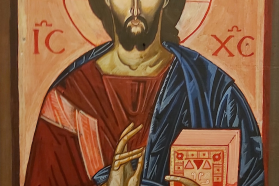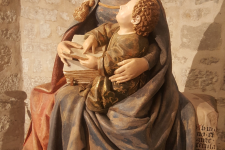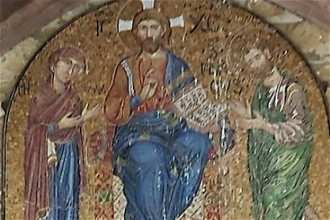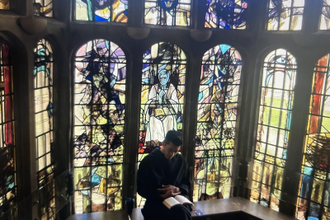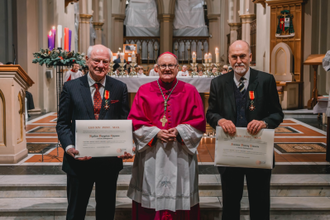Sunday Reflection with Fr Robin Gibbons - 26 January 2020

Third Sunday in ordinary Time
These words of Jesus should have a profound effect on us because they are crucial to his ministry and proclamation of the Good News and of what we too seek: "Repent, for the kingdom of heaven is at hand."(Mt 4:17) We hear and read these words often enough, but how far does that phrase sink into our faith life and religious consciousness, what does it mean?
To 'repent', or as we might call it in the New Testament Greek term, 'metanoia', means to change direction, literally to turn around, perhaps also to see things from a different vantage point and change them. Are we aware that this type of 'repentance' is what we are called to do, not once but frequently, even every day? That small word is a radical call to change, and as St John Henry Newman puts it, 'to change often' is necessary, in order that we might become perfect, as our God is perfect. That small word tells us that faith is never static, never complete, but part of a long search and a journey that finally ends (we hope) in the kingdom of heaven.
But just what is the kingdom of heaven, how can it be near us, we are told we are somehow now part of it? The second part of Jesus' sentence suggests that somehow when we change our life, when we accept his invitation to the path of discipleship in the Gospel, the coming kingdom is very near to us, unseen but known, but we must not confuse 'church' with 'kingdom', they may connect but they are not the same. Fortunately the Church has never defined itself as the Kingdom, though some zealous people may have attempted to do so, but it is a misconception. The great theologian, Karl Rahner, adapting Saint Augustine's words put it like this: "Many whom God has, the Church does not have. And many whom the Church has, God does not have."
This is a clear reminder not to confuse the two, for the Kingdom is greater than the Church, and its boundaries are inclusive of those who learn the humility of Christ: "Not everyone who says to me, 'Lord, Lord,' shall enter the Kingdom of heaven, but he/she who does the will of my Father who is in heaven" (Mt 7:21). It is in living out the love of God in mercy, compassion and joy that we find the secret of the hidden kingdom, for we are part of it through our belonging to Christ!
This is an antidote to any triumphalism Christians may have and a reminder of the depths of God's own humility in identifying with the weakest and least.
Karl Barth wrote that the kingdom of God is "from the human point of view an insignificant kingdom, a kingdom hidden like the leaven in three measures of meal (Mt. 13:33), like the treasure in the field (Mt. 13:44), like the grain of mustard-seed which is smaller than all other seeds (Mt. 13:32)." The Kingdom of God is not about claims of special knowledge, or theological insights into matters of doctrine and faith, important though these may be. The key is linking that word 'repent' with our own search for the Kingdom. Jesus Christ came to us in weakness and lowliness; we believe it is there in love and care for little ones of life and the search for Christ in the hidden things of our lives, that we truly discover God's power, glory, and victory. As Barth wrote, "His (Christ's) power is present to us in the form of weakness, His glory in that of lowliness, His victory in that of defeat." And all are called to the Kingdom! Amen to that!
Lectio Divina
Psalm 27
The LORD is my light and my salvation;
whom should I fear?
The LORD is my life's refuge;
of whom should I be afraid?
When evildoers come at me
to devour my flesh,*
These my enemies and foes
themselves stumble and fall.
Though an army encamp against me,
my heart does not fear;
Though war be waged against me,
even then do I trust.
II
One thing I ask of the LORD;
this I seek:
To dwell in the LORD's house
all the days of my life,
To gaze on the LORD's beauty,
to visit his temple.
For God will hide me in his shelter
in time of trouble,
He will conceal me in the cover of his tent
and set me high upon a rock.
Even now my head is held high
above my enemies on every side!
I will offer in his tent
sacrifices with shouts of joy;
I will sing and chant praise to the LORD.
Fr Richard Mc Brien - What is the Kingdom?
The Church Strains Toward the Kingdom!
But everything, including the Church, is subject to the Kingdom. In other words, the Church is answerable to the Kingdom, and gets its credibility by manifesting the Kingdom and not vice versa. It was to make this exact point that the Second Vatican Council added the material contained in article 5 of the Dogmatic Constitution on the Church. Because many of the bishops still seemed to be making the equation between Church and Kingdom even after two or three sessions of the Council, it was decided that some further clarification was needed.
The Council document makes it clear that the Church is at most "the initial budding forth" of the Kingdom. In the meantime, "the Church strains toward the consummation of the Kingdom and, with all its strength, hopes and desires to be united in glory with its King" (#5). The completion of that union between Church and Kingdom is yet to be realized.
If the Church is not itself the Kingdom, then at least three things follow: (1) the Church as a community and as an institution is not above criticism and reform; (2) the primary mission of the Church is not precisely to bring people into the Church but to bring them into the Kingdom; and (3) God also works outside the Church and even in other religions.
This third item is particularly jarring to a Catholic whose religious formation occurred long before Vatican II and who has not had the advantage of an explanation of how and why this change in perspective took place.
"Whatever happened to the 'one true Church' formula?" First, we understand now that Church applies to the whole Body of Christ, to all Christians, and not just to Catholics alone. As the Decree on Ecumenism declares: ". . . all those justified by faith through baptism are incorporated into Christ. They therefore have a right to be honoured by the title of Christian, and are properly regarded as brothers and sisters in the Lord by the sons and daughters of the Catholic Church" (#3).



